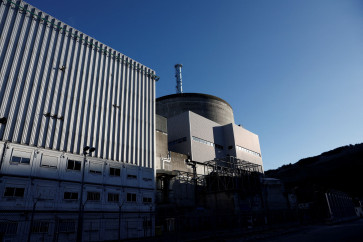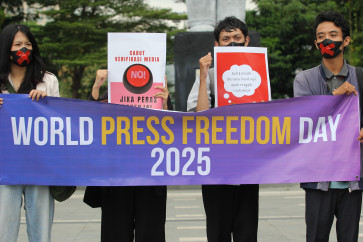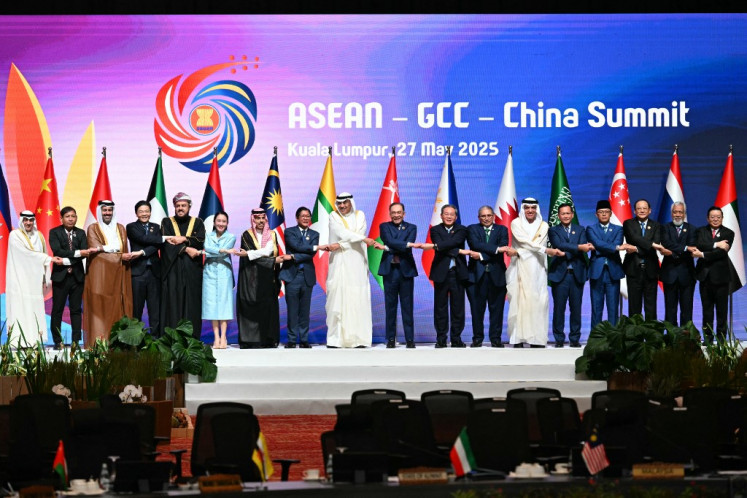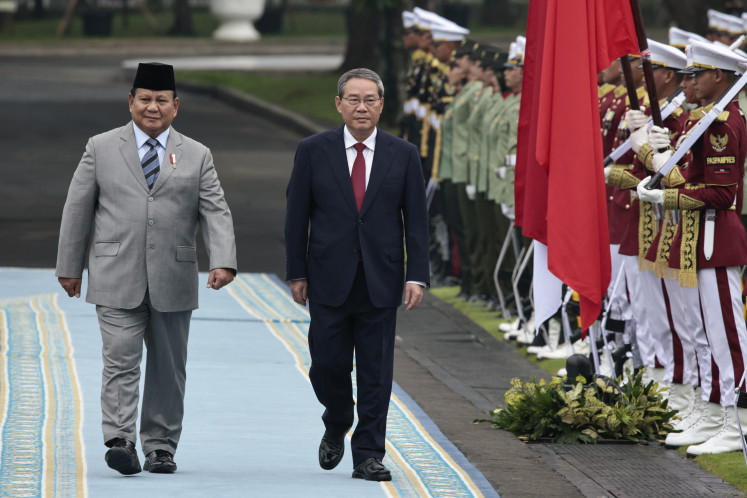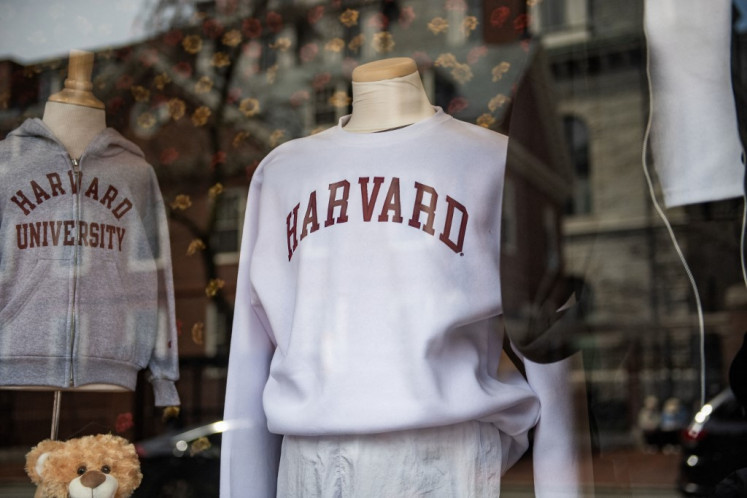Bandung microrecycling initiative for plastic
Change text size
Gift Premium Articles
to Anyone
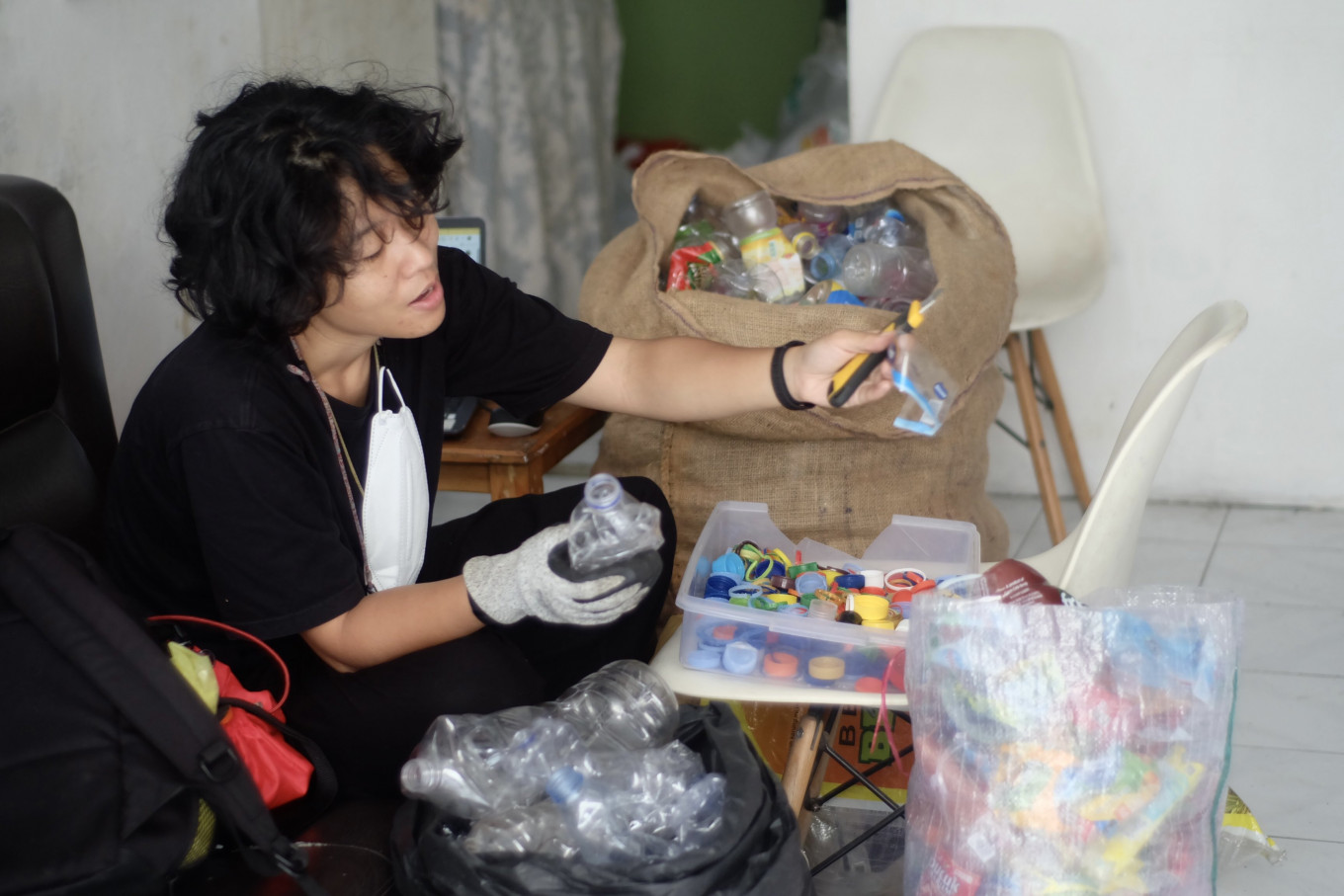
P
art of Bandung’s new-wave microrecycling initiative for plastic, Newhun and Trash Smith talk about their journey, contrasting motivations and ideas behind their conduct.
Plastic waste is a perennial problem in this modern world. Every year, plastic waste that could weigh anywhere between 4.8 million to 12.7 million metric tonnes enters the ocean all over the globe. Indonesia released 56.333 metric tonnes of plastic into the ocean in 2021. In Bandung, out of the 1.735,99 m3 / 1.529,04 metric tonnes of daily municipal waste generated per day in 2021, plastic waste takes up 18.68 percent of the volume.
This monstrous chunk of plastic waste that keeps piling up each passing day, however, is largely untreated after reaching landfills and is more likely not to experience further processing or recycling in the future as it lays dormant. Ultimately, due to its mostly non-degradable nature, plastic waste will be a new geological marker for an era in the Anthropocene epoch.
The situation with plastic waste is looking dire. However, a number of new initiatives in Bandung resonated with the sense of urgency around the global issue and have started a new wave of plastic microrecycling movement, sparked, up to a certain level, by the Eindhoven-based open hardware plastic recycling project: Precious Plastic.
This wave of initiatives in Bandung includes Newhun, Trash Smith, Olah Plastic and a namesake Bandung workshop of Precious Plastic. We talked to two of the initiatives, Newhun and Trash Smith, about their journey in the plastic recycling world.
Maelstrom of garbage
It might be the feeling of helplessness that initially set in when Moch Saeful Rizki, Bandung plastic recycling initiative Newhun’s founder, witnessed the grandeur of the Bantargebang landfill in Bekasi, West Java, in 2020.
Saeful was there with his community, Jajan Pahala (Reward Snacks), busily distributing free meals to scavengers and workers at the largest landfill in the world. The stream of trucks, filled to the brim with garbage and making their way through the dump, was seemingly endless.
“I thought that we were really doing nothing with garbage there,” Saeful recalled, speaking to The Jakarta Post on Dec. 21, 2022. “It just moved from the bins in front of our houses to a TPS [temporary dump] then to the TPA [final disposal site].”
As the feeling subsided on his way home to Bandung, he decided that he needed to do something. “Anything. Even the smallest thing, whatever it is,” he said. He then decided on experimenting with plastic, all the while fully aware about his Arabic literature background that he obtained from Padjadjaran University.
After a short while of scouring the internet, Saeful came across the open hardware plastic recycling project, Precious Plastic, who supplied open source resources for people all over the world to start their own plastic recycling initiative.
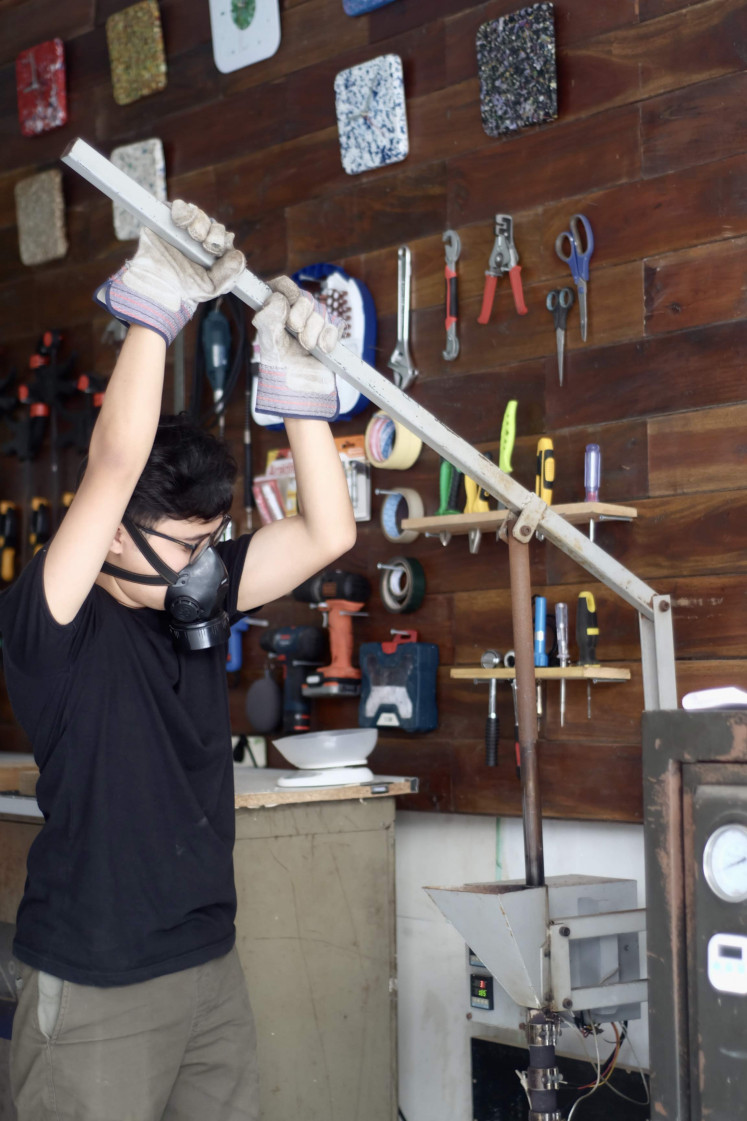
Emptying the piggy bank
Saeful, who was still living with his parents back when he first thought about the initiative, started looking for partners and a workshop so that he could start tinkering with plastic waste.
He remembered his friend, Reggy Ramadhany, who studied mechanical engineering at the Bandung Polytechnic of Manufacturing, and childhood friend Yahya Rijal, who, at the time, was running Freddo, a now-closed coffee shop at Jl. Merak, Bandung.
The trio operated from a rundown garage located right behind Freddo for a while, experimenting with simple shapes for coasters with an injection machine that they commissioned for Rp 7 million (US$449) from the Polytechnic and a borrowed plastic shredder. “Because we had no money [laugh].”
He recalled that he practically emptied his bank account for the injection machine as the sole “investor” back then. “Yahya’s coffee shop was on its last legs and Reggy had just finished his undergraduate studies.” The shredder would cost them Rp 25 million to commission, according to Saefu, which is why he shuddered a bit when the borrowed one broke down.
Everything seemed to snowball after that. They managed to secure their funding from a lecturer at the Polytechnic and ended up meeting a kindred spirit who was more than happy to welcome them into their space in Cimahi (they moved to Cihapit after Freddo, but then had to move again).
Moreover, the trio managed to finish a product that they were developing since the very start: A wrist watch made from recycled plastic. The watch’s frame and the strap are entirely made of recycled plastic, sold for Rp 799,000 a piece, something that Saeful was quite proud of noting it as “the first one in Southeast Asia. I’ve always been a fan of wrist watches,” he said, as he gave a wide smile.
While Newhun’s take on the recycled plastic initiative seems more like an honest practitioner who is eager and driven to make a change, another initiative in Bandung, Trash Smith, is taking a slightly different approach than its fellow initiative.
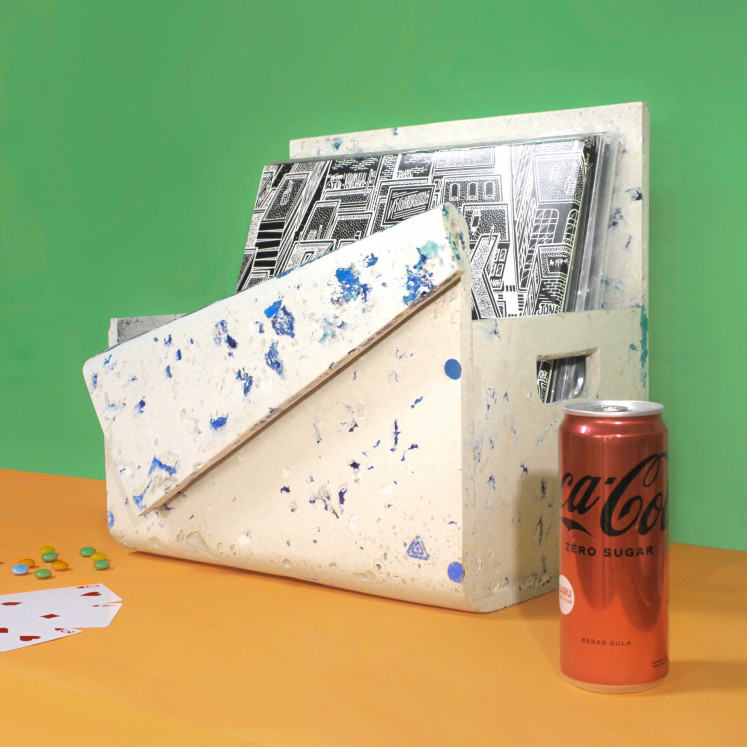
A stoic researcher
An unassuming one-story house at Jl. Cigadung Raya Barat doubles as a workshop for Trash Smith. A large, waist-high sack full of plastic containers was sitting at the porch right next to a motorcycle that was awkwardly missing its seat.
Right across them was a pair of ovens, roughly two thirds of an adult’s wingspan. Remnants of white hardened molten plastic were protruding downwards from the oven’s mouth, facing a rough and ready workbench where Bintang Gantyna, Trash Smith’s founder, does most of his design work for the initiative.
“I’m still active in doing and supporting research projects,” said Gantyna, speaking to the Post on Dec. 23, 2022 at his workshop. “D plus 2 or D plus 3 [after the earthquake], maybe, I went to Cianjur to give a workshop on plastic.” Gantyna, a product design graduate from the Bandung Institute of Technology, often contributes to projects initiated by his alma mater.
At the 2021 Bandung Design Biennale, Gantyna worked on three different projects. He developed a leather substitute material that was derived from vegetables, which was funded by the British Council. The other two were based on recycled plastic in which he developed a prototype set of tape cassette shells along with Bandung collective 1.Spesifikasi and a set of longboards that was exhibited at the biennale and also rode around by the visitors.
Unlike Newhun, which stemmed from a pent-up concern towards the environment, Trash Smith’s perception toward the materials that they currently dabble in is rather uncomplaining. “I see the potential more,” Gantyna said as he tussled with his dog, Zappa.
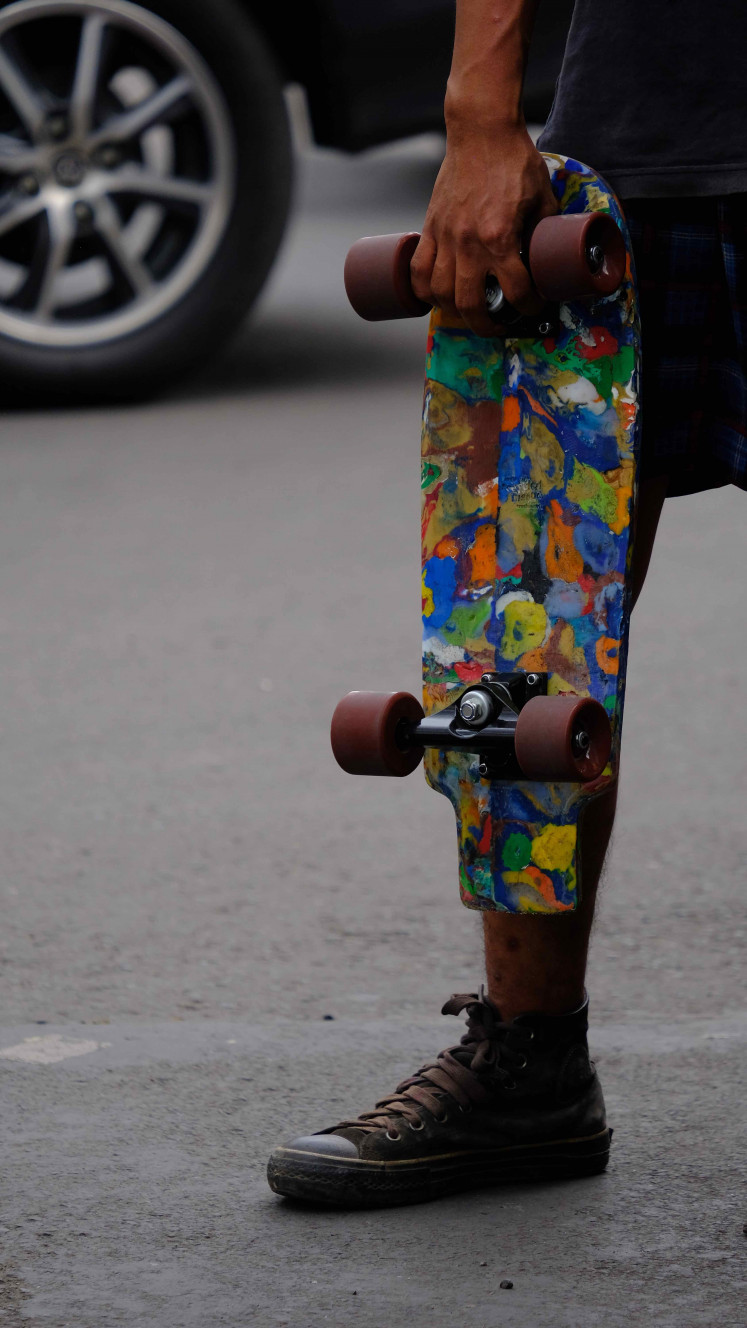
Inclusive Craft
What drove him into the plastic recycling world was a course that he took in 2018, one that required him to do an internship at organizations or corporations in line with his study in product design. “I interned at Green School in Bali. Mid 2018, I reckon. That’s where I first learned about plastic recycling on a micro scale, where I learned how to process plastic for the first time.”
Gantyna said he discussed a lot with Potato Head, a beach club turned creative microcosm in Petitenget, Bali, “before Space Available was established. I had the opportunity to make a couple of prototypes for them as well.”
“Not what people would say ‘saving the earth’,” Gantyna said about his motivation for being in the plastic recycling world. “More because of my background in product design. I’m just focusing on using materials that are considered as waste to be [processed into] products that have the added value of aesthetics and economy.”
In the long run, Gantyna’s focus in the field will be in crafting. His views toward plastic are also not of the dystopian kind. “I just see it as material that has potential for crafting. Whether or not there’s an impact in the end, however small it may be on an environmental or social level, it’d be a byproduct of the focus, which is to craft. If I think about [the impact] all the time, it will never end.” He is also committed to opening his workshop, especially for students working on their final school projects or simply researching waste materials and transforming them into products.
Gantyna’s intent for Trash Smith is to be as inclusive as possible, with a particular aim toward the youth subculture. “Inclusive in terms of product output and the selling price, maybe,” Gantyna mused. Trash Smith’s products start from Rp 21,000, from marbled coasters to recycled polypropylene containers for 12” vinyl records, which sell for Rp 600,000.
Both Newhun and Trash Smith are currently able to sustain themselves economically, enabling the founders and members to focus on their respective initiatives.


